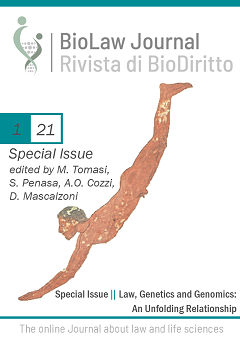From "familial searching" to "forensic genetic genealogy": new frontiers – and challenges – of DNA analysis in criminal investigations
DOI:
https://doi.org/10.15168/2284-4503-788Parole chiave:
DNA, genetic forensics, genetic genealogy databases, familial searchingAbstract
Since its discovery, DNA analysis has been an important tool in criminal investigations: the creation of national DNA databases, retaining the genetic profile of criminals, revealed to be crucial in solving serious crimes. In recent years, the expansive use of DNA analysis, together with scientific and technological progress, led to the development of new sophisticated investigative techniques, from the so-called "familial searching" to the more recent use of "forensic genetic genealogy", based on the exploitation of commercial genealogy databases by law enforcement authorities. Notwithstanding their effectiveness, these new instruments raise serious ethical and legal concerns: this paper aims at presenting these complex challenges, by underlying the need to strike a proper balance between the public interest to a rapid and efficient identification of unknown offenders and the dangerous shift towards "genetic surveillance".##submission.downloads##
Pubblicato
2021-05-12
Come citare
1.
Formici G. From "familial searching" to "forensic genetic genealogy": new frontiers – and challenges – of DNA analysis in criminal investigations. BioLaw [Internet]. 12 maggio 2021 [citato 28 febbraio 2026];(1S):305-28. Disponibile su: https://teseo.unitn.it/biolaw/article/view/1645
Fascicolo
Sezione
Troubling historical roots and contemporary challenges





